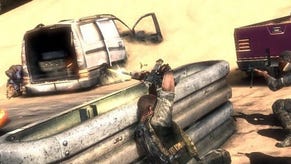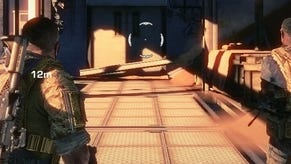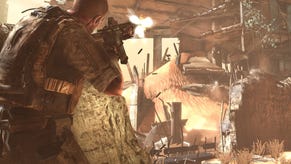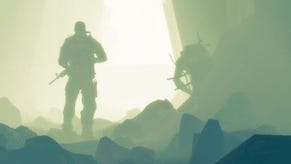Spec Ops: The Line
SandShock?
Walking around Yager's home city of Berlin, it's easy to understand why the developer is making a city-based third-person-shooter. Berlin may be a modern centre of financial security and a model of civic, dare I say it, efficiency, but it has a long history of grand conflict, from the turmoil of ancient history right up to the front lines of the Cold War. Anything older than 60 years is covered in bullet-holes and shrapnel scars, a chilling reminder of the intense street-to-street fighting at the end of World War II. Statues and memorials commemorate the myriad fallen of all nationalities, as well as victories and conquests of the past. Everywhere among the charming Christmas markets is scattered evidence of the human capacity to destroy.
Perhaps even more apparent, especially from the vantage point of the huge tower which dominates the skyline, is the ragged legacy of the Berlin Wall, which only 20 years ago cast a grim concrete shadow over the social, political and financial divide between East and West. Viewed from above, the line of the wall still delineates the ideologies of Capitalism and Communism in many parts of the city, with modern or well-preserved older buildings on one side and a host of functional Soviet Bloc apartments on the other. These contrasting themes of order and ruin, of opulence and poverty, have permeated to the core of Spec Ops' design.
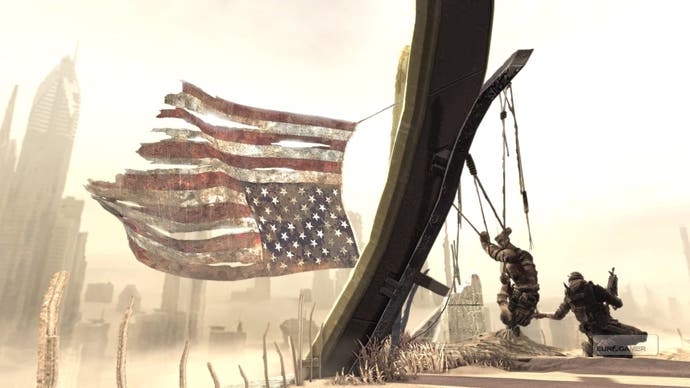
The game is set in near-future Dubai, a glittering gem of ostentatious prosperity in one of the world's poorest and most desolate areas. In the game this manmade fortress of luxury has succumbed to nature's sustained assault, buried under a sudden and hitherto unprecedented sandstorm of Roland Emmerich proportions. The tops of buried skyscrapers peek through ever-shifting dunes, whilst the city's chattels of excess lie forgotten and useless in its streets. What was once a spotless landscape of gleaming glass and burnished marble is now a ruin, its carefully planned urban topography now at the mercy of unrelenting sand.
The contrast is at its most apparent once the action leaves the streets and goes indoors, as the interiors of the city's fabulous buildings remain relatively untouched. Brass and polished stone bedeck the cool lobbies of hotels, offices and residential buildings - starkly incongruous to the destruction wrought on the buildings' exteriors. The tempting parallel is BioShock with sand, but there's not quite so much of the crushing, claustrophobic oppression of 2K Boston's undersea epic here, nor its fantasy; what we see is very firmly rooted in literally gritty realism.
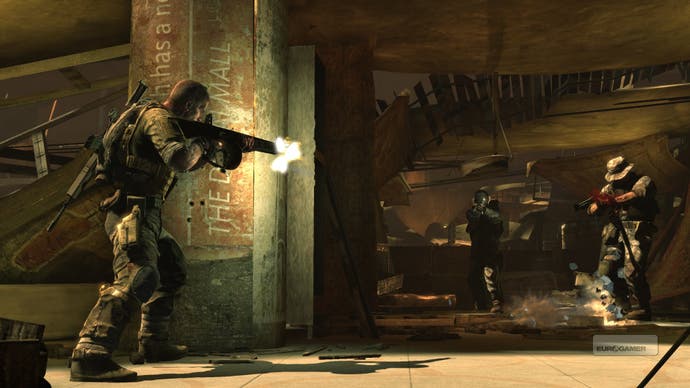
Heading into this city of contrasts is player-character Captain Walker, along with two Delta Force squad-mates. They're here to rescue and repatriate Colonel Conrad, a rogue officer who stayed behind to help the disaster-struck locals rather than following orders to return to the US. The military view is that he's turned, going local and refusing to contact or acknowledge his erstwhile masters. It's Walker's job to get in there, locate the Colonel and get him back out alive.
If the story sounds a little familiar, give yourself a pat on the brain. Yager openly embraces the primary influence: Joseph Conrad's brief masterpiece Heart of Darkness and Apocalypse Now, the film it inadvertently spawned. These tales of the fragility of humanity's thin façade, and how easily it's corrupted by arduous and adverse conditions, provide much of the inspiration for Spec Ops' pithy storytelling. In the brief demo we see, it quickly becomes clear that Conrad is not the man he once was, and that the fate of the previous squad sent to extract him wasn't pretty.





